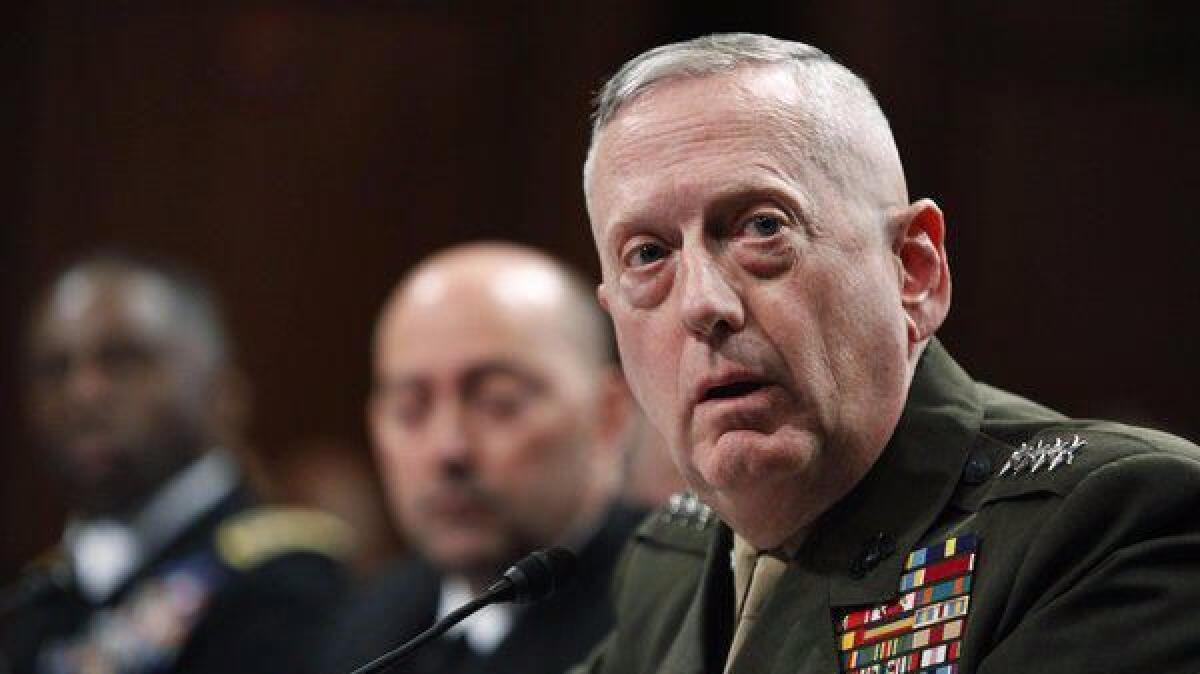Senate committee debates civilian control of the military before Mattis hearings

- Share via
Reporting from Washington — U .S. lawmakers appear prepared to grant Donald Trump’s pick for secretary of Defense an exception to circumvent a law that mandates civilian control of the military.
Federal law dictates that the person leading the Pentagon cannot have served in uniform in the last seven years. Former Gen. James N. Mattis, who retired from the Marines in 2013, needs Congress to pass a law to get around that restriction.
The Senate Armed Services Committee is scheduled to begin his confirmation hearing on Thursday, but the panel scrutinized the current law for more than two hours Tuesday with two experts, who also signaled little opposition to approving what amounts to a waiver.
Eliot Cohen, a former senior Pentagon and State Department official who is now professor of strategic studies at Johns Hopkins University, defended civilian control of the military, which he called “central to the American experience since colonial times.”
Cohen, who publicly warned other conservatives from serving in a Trump administration after the November election, said a waiver was appropriate in this case because Mattis could help prevent what he called “wildly stupid, dangerous or illegal” actions by the incoming White House.
“I have sharply criticized President Obama’s policies, but my concerns pale in comparison with the sense of alarm I feel about the judgment and dispositions of the incoming White House team,” Cohen told the committee.
“There is no doubt in my mind that a Secretary Mattis would be a stabilizing and moderating force, preventing wildly stupid, dangerous or illegal things from happening,” he added.
Mattis, who served four decades in the Marines, headed U.S. Central Command in his final three years and commanded forces in Iraq and Afghanistan. Known as a military thinker and strategist, he is well-respected inside and outside the military.
Kathleen Hicks, director of the international security program at the Center for Strategic and International Studies, a Washington think tank, also recommended granting the waiver — the first since Congress agreed to let Army Gen. George C. Marshall become secretary of Defense in 1950.
“I am persuaded not only by his expert grasp of the most important security issues our nation faces but also by his clear commitment to and embodiment of the principles of civilian control of the military,” she said, citing “Warriors and Citizens,” a publication that Mattis recently co-edited.
Cohen and Hicks warned that permanently amending or eradicating the law would be detrimental to national security by encouraging politicization of the military, but that Mattis merited an exception.
The sentiment was echoed by Sen. John McCain (R-Ariz.), chairman of the committee, who reiterated his strong support for the retired four-star general during the hearing.
“There is no military officer I have met in my lifetime with a deeper understanding of civil-military relations than James Mattis, “ McCain said. “His character, judgment and commitment to defending our nation and its Constitution have earned him the trust of our next commander in chief, members of Congress on both sides of the aisle, and so many serving in our armed forces.”
Sen. Jack Reed (D-R.I.), the ranking member of the committee, requested the hearing ahead of the vote on the waiver, which is expected to take place on Thursday.
Sen. Kirsten Gillibrand (D-N.Y.), who previously had said she would not support granting an exception, was the lone opponent at the hearing.
She said she is concerned that Trump also chose recently retired generals to head the National Security Council and the Department of Homeland Security. She warned about the impact so many generals may have “on our overall national security policy.”
Twitter: @wjhenn
ALSO:
Climate change is real: Just ask the Pentagon
Overweight, tattooed, stoned? The Pentagon may still want you
More to Read
Get the L.A. Times Politics newsletter
Deeply reported insights into legislation, politics and policy from Sacramento, Washington and beyond. In your inbox twice per week.
You may occasionally receive promotional content from the Los Angeles Times.











